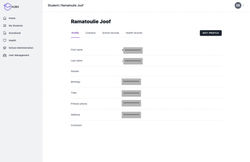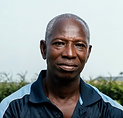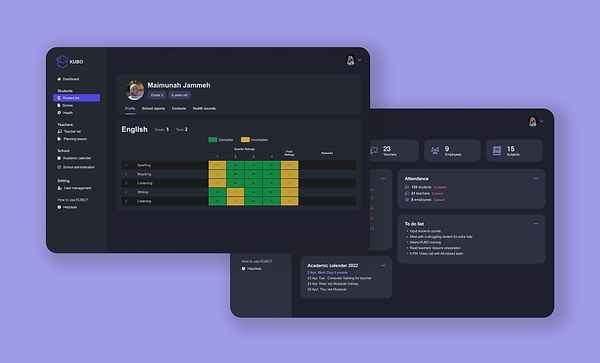.jpg)

Optimized KUBO software to help teachers in isolated Gambia schools, to work more efficiently
2022 • UX research • UX design • UI design • status: to be developed
Overview
My volunteering time for KUBO wasn’t just about design project. It was an adventure I’ll never forget. I got a fun opportunity to optimize KUBO, a school management software that works without internet connection.
This powerful tool helps teachers and school staff in The Gambia isolated areas to manage and analyze their students' scores and data in more simple and efficient way. Seeing KUBO make a real impact on users day-to-day challenges was incredibly fulfilling. ☺
Currently, KUBO platform is running in The Swallow school in The Gambia. With the support of Afrodidact, we hope we can expand to another isolated area in Africa. 🤞🏾
Outcomes
✔ 3 new features:
-
feature to filter students based on certain categories
-
dashboard to see overview of school administration
-
freature to track student progress fast
✔ More intuitive experience
✔ Design documentation
Problems
Even when KUBO operates, teachers & school staff still do some tasks manually
With expensive and weak internet, teachers and school staff in The Gambia have no choice but to rely on paper for almost everything. Manually analyze students' scores, track students' progress, sort students, and manage school administration. Slow and tiring process. Worst of all, when floods occur. It destroyed the written records, adding their frustration.
Though KUBO has eased some challenges especially data entry, teachers and school staff were still overwhelmed with some administrative tasks. Consequently, they still hardly focus on the main task, which is teaching.


Learning activities at Albreda school.
Lack of electricity and internet.


.jpeg)
Some students' scores and school administrations are written manually on paper.
Research

Key insights
💡Simplify the process of admin tasks will help teachers focus more on teaching and help students.
💡 Provide an efficient way to sort students by ages, languages, tribes, and genders. This can save users' time and reduce frustration in organizing regularly school events, activities, administrative needs, extra lessons, and special needs.
💡 Provide an efficient way that allows teachers to identify quickly students who need extra support. This will help them preparing quicker extra lessons for students who have low performances.
💡 Provide an efficient way that allows users to access school activities data quickly without jumping across multiple platforms. This can save their time in order to create to-do list and boost their productivity
💡 User-friendly design and guidance can help users to navigate Kubo independently, without relying on colleagues. This can increase users' productivity and confident.

Overcome the cultural barriers to get honest feedback
Getting honest feedback from Gambian participants took more time. I compared it to what I experienced with Europeans in my past projects. I noticed Gambian participants tend to be very polite and might avoid critical feedback, as they see it as possibly disrespectful.
When I tested KUBO with Gambian teachers and a headmaster, they initially said everything was good, but they struggled to accomplish tasks. I realized I needed to build more trust and create more safe space for open communication. I assured them that honest feedback, even if it was negative, was crucial for improving the platform and making it helpful for their work. Bit by bit, their feedback became more open and honest.

"How to design for digital products in isolated areas?"
With the constraints KUBO has currently: operates in isolated areas with weak and expensive internet connection, I came up with a question:
Recently I attended a webinar and read some articles about sustainable design in UX UI. It opened my eyes that the sustainable design principle can help me in designing KUBO. It's about creating digital products that are efficient and also accessible in any condition.
The strategy includes:
-
Minimalist design by reducing unnecessary elements, animations, and heavy graphics
-
Dark mode
-
Prioritize essential features
These help to reduce the power consumption, which is crucial in areas with unstable electricity.
Solutions & impacts:
before & after redesign
Based on the user pain points, the insights of the usability test and what users need, KUBO can provide:

I redesigned KUBO platform with dark mode. A change that saves power, which is important in places with limited electricity like the schools in The Gambia.
By using less bright light on the screen, dark mode helps KUBO run longer without draining the battery. And as a bonus, it’s easier on the eyes for users during those long-hardworking hours.
What I learned
3
It took more time to get honest feedback
Because of cultural differences, it took longer to get honest feedback from Gambian participants compared to Europeans in a previous projects. I found Gambian participants are polite and avoid giving critical feedback, as they may see it as disrespectful. When I tested the platform with Gambian teachers and a headmaster, they initially said they were satisfied, but struggled with using it. So, I worked to build trust and encouraged them to share their feedback, even if it was negative feedback, because it would help improve the platform.
1
Before going to The Gambia, I often compared my life in Indonesia, a third-world country, to Europe. Indonesia always seemed left behind in education, science, and technology. But when I visited The Gambia, I realized how lucky I was to have had access to technology and a good education from a young age. Even though it may not have been the best, I still had more access than many.
In The Gambia, I met people raround 5 to 50 years old who were incredibly happy because we set up computer classes in their villages. It was their first time ever using a computer!




























.jpg)









